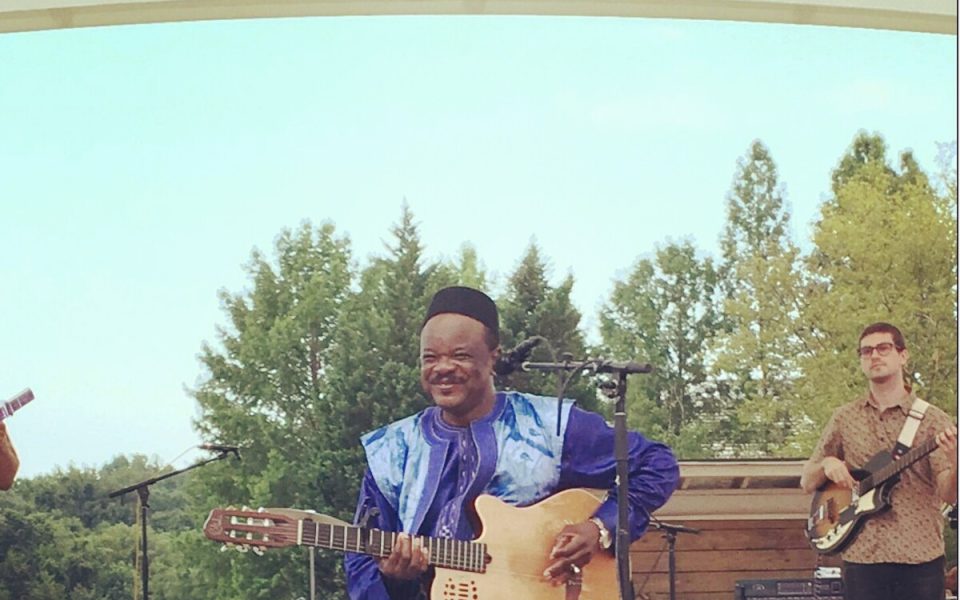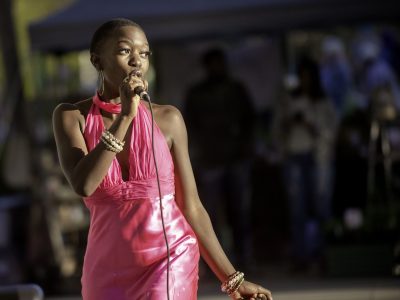The crowd stretched across the ample hillside of Barber Park as a thunder vibrated the earth. Though a summer storm was waiting in the gunmetal clouds overhead, the thunder came from the stage — a long row of drums circled around the dance troupe. Skilled hands tapped on the calfskin heads of congas, djembes and ashikos. The rhythms sounded as the dancers’ bare feet raced and glided across the stage and, suddenly, the dancers were walking among the grass. While among the gathered crowd, the dancers began taking the hands of the audience, lifting them up, beckoning them to join in the music. People rose from their place on the grass like blossoming flowers, excited, smiles stretched across their faces as the music moved their spirits.
And this was only the opening of the concert.
Greensboro’s SUAH African Dance Theater kicked off the evening for the seventh concert in the Levitt AMP music series on July 22. The dance group moved to the music provided by a vast drum circle, as well as a full band playing the melodies and a giving slightly modern vibe to the traditional music. Dressed in the colorful, ceremonial attire of Liberia, the dancers were comprised of a mix of men and women.
The final dance of their set featured a call-and-response form. The men stood on the left of the stage as the women stood opposite. The first dancer stepped out into the middle of the stage, tapping his feet to the beat of the drums, moving his body and arms in a hawk-like motion, calling another dancer to join in. Suddenly, all the dancers moved in unison, like waves across the stage. Their bodies twisted fluidly and seemingly without effort, simply responding to the driving music.
Audience members rose from their seats sporadically, hearing the call of the drums, and joined in the dance. And if the crowd felt inspired from the opening dances, there was still much more that was to come.
As the drums and dancers cleared the stage and new equipment took their place, Cheick Hamala Diabate sat at the front of the stage. Surrounded by a myriad of instruments laid at his feet, he plucked into the opening song, and the conversations that had arisen between sets were silenced. Holding his guitar in the classical tradition, the melodies echoed across the hill. The full band behind him dove into the rhythm, and truly, the evening began.
Originally from Mali, Cheick Hamala Diabate has been touring around the world since 1985. His music is steeped in the traditional melodies and songs of his native northwest African nation, while also incorporating stripped-down forms of American blues and jazz. But what sets Diabate apart is his use of traditional instruments. Famed for featuring n’goni, Diabate is recognized worldwide as a master of the traditional West African instrument. The n’goni is a distant relative of the American banjo, wrapped in animal skin with only three strings. Diabate is renowned for his music, having been nominated for a Grammy award in 2007, and he has gained countless recognition for his songs which has led him into collaboration with such acts as Bela Fleck, Corey Harris and many more.
But though there is a catalogue of Diabate’s accomplishments, there was no place for it at this concert. The show was about the music, and Diabate and his band did not let the audience down.
Drums — which provided unique African rhythms — held down the set neatly in synchronicity with a hand-drummer and bass guitar, while Diabate plucked his strings and sang in his native Bambara tongue. Off to the side of the stage was a single interpretive dancer, moving to the music in wildly beautiful bursts of energy. And just as the crowd was settling in to the sounds of the music, Diabate showed his famous power of musicianship and slid into a modern form. The backing vocalist began rapping over the ambient, resounding tones. Pouring out lines at an incredible speed, the back-up singer spoke in his native Bambara language. Diabate’s majestic melodies and use of electronic effects pedals drove the sounds emanating from the stage. Though used only sparingly, the tones he created blended music that can seem quite foreign to an average ear, and yet he brought them into a familiar realm of sound.
Sometimes free, city-organized events and concerts can seem boring and uninspired. But the music brought to Barber Park on July 22 surpassed an average free summer concert. It marked the continuing growth in musical taste in the Triad, as the crowd was vast and danced for long durations of the concert.
Even after an hour of playing music, Diabate still had a peaceful smile on his face as he looked out over the crowd. With a quick glance to his band as he began the final song, there was a brief moment where Diabate closed his eyes, and seemed truly lost in the music. And with his dancer glistened in sweat and the band playing just as tight as when they began, the crowd cheered all the more, as if they hoped the concert would not end any time soon.
Join the First Amendment Society, a membership that goes directly to funding TCB‘s newsroom.
We believe that reporting can save the world.
The TCB First Amendment Society recognizes the vital role of a free, unfettered press with a bundling of local experiences designed to build community, and unique engagements with our newsroom that will help you understand, and shape, local journalism’s critical role in uplifting the people in our cities.
All revenue goes directly into the newsroom as reporters’ salaries and freelance commissions.





Leave a Reply